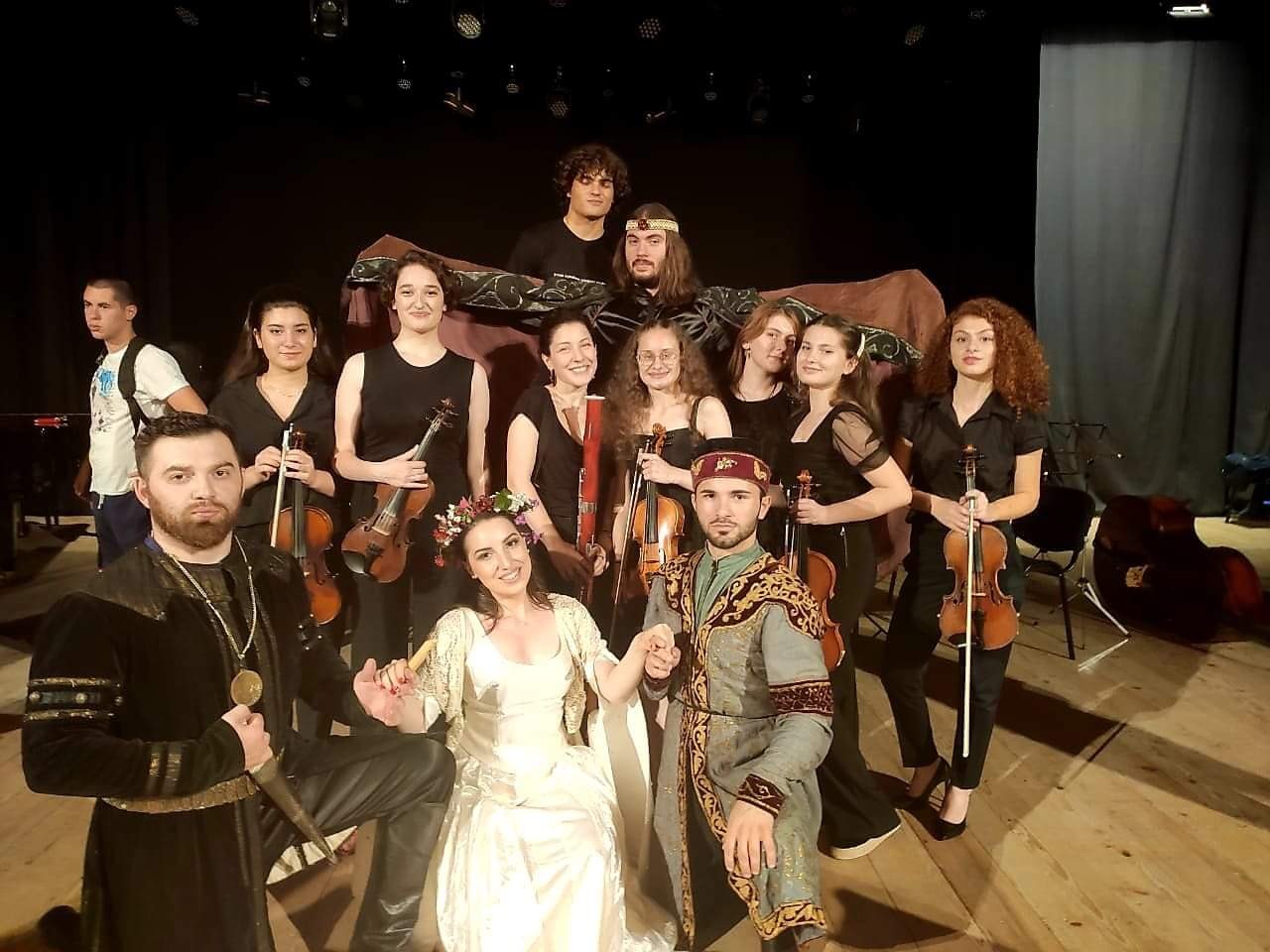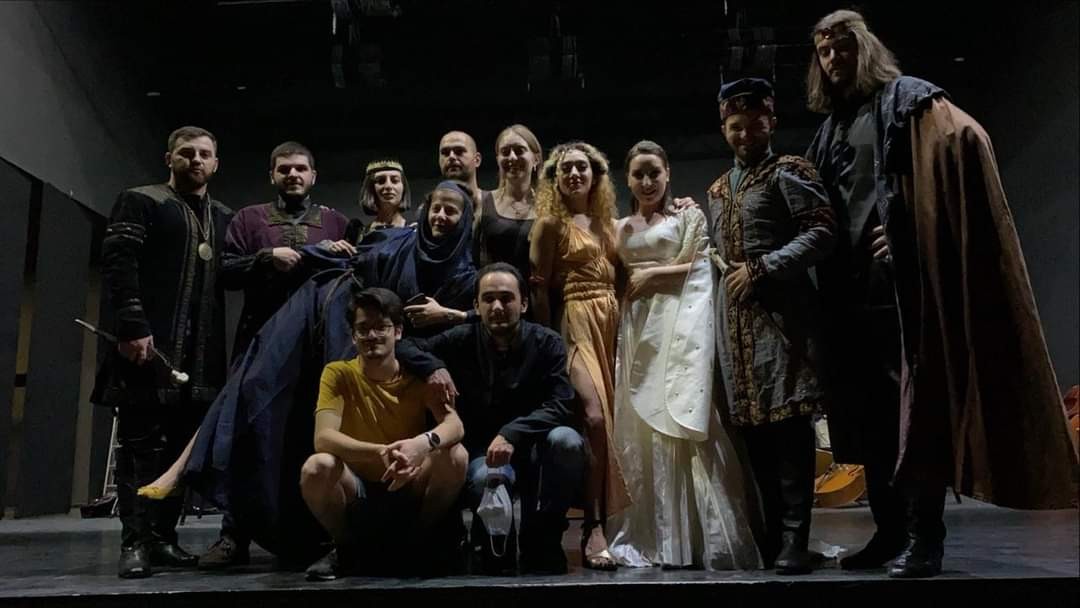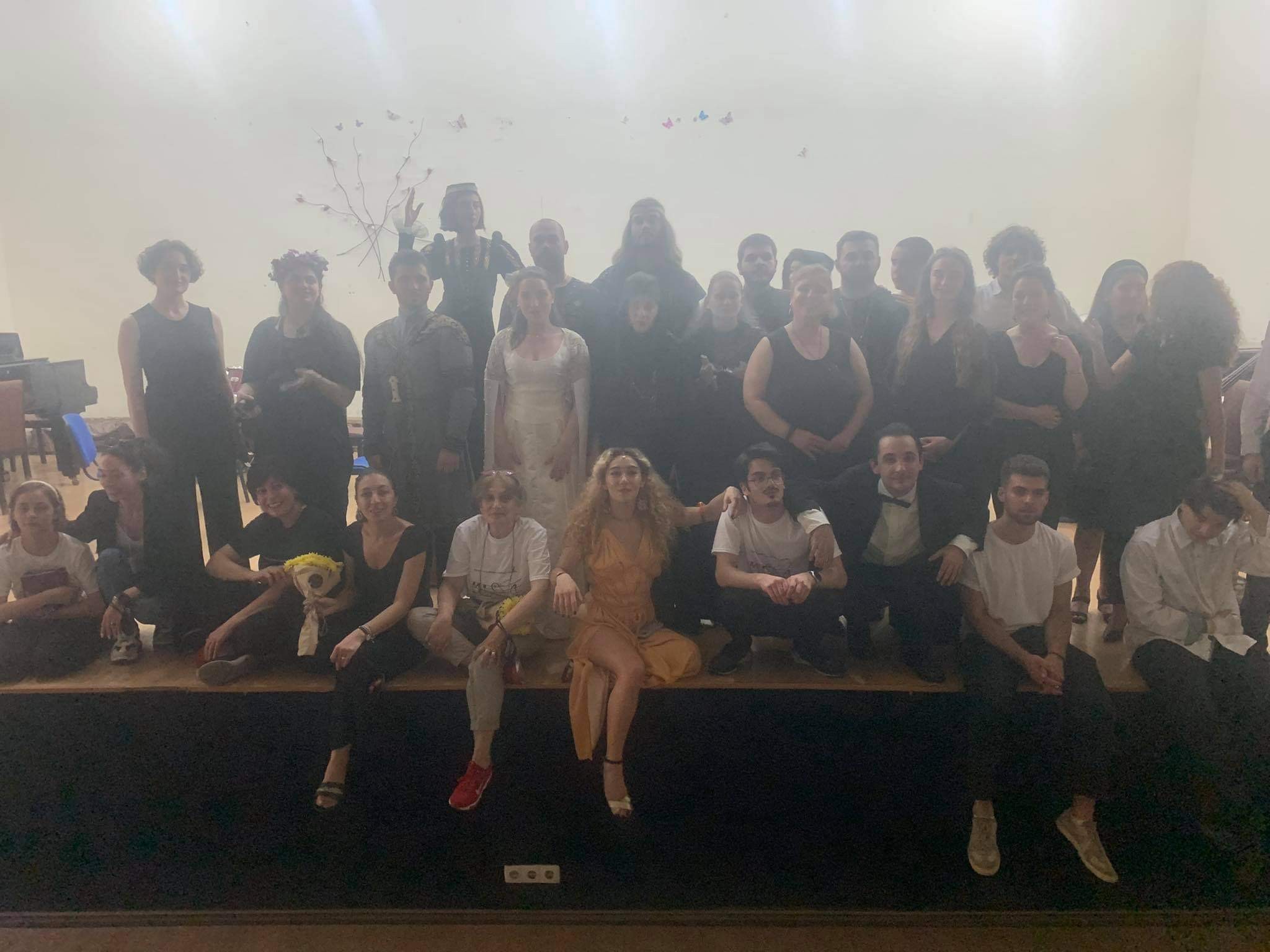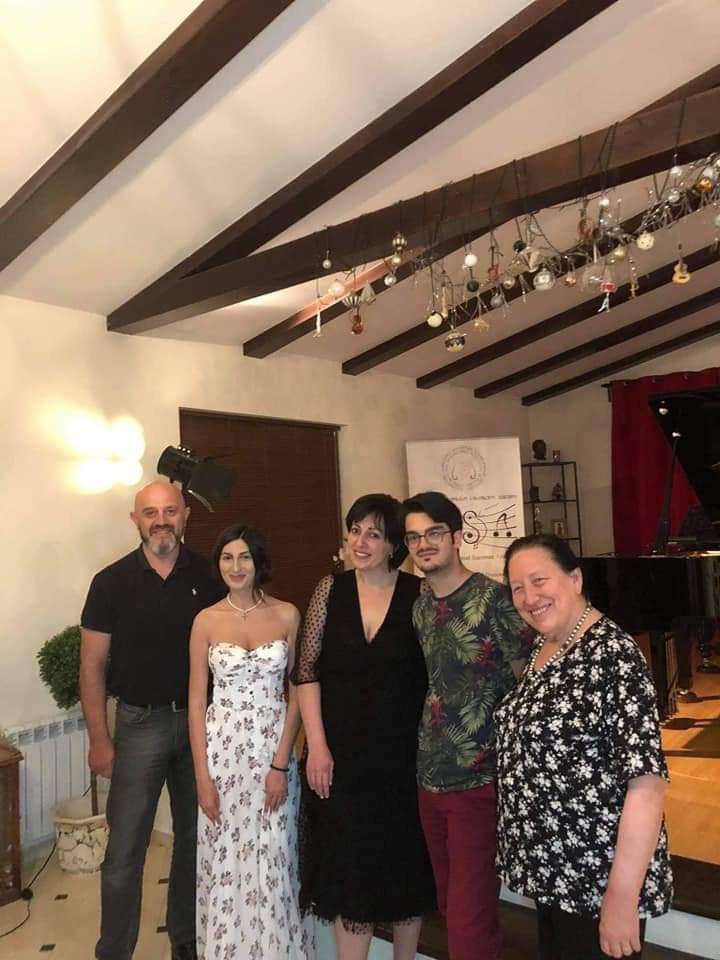Regulations of the competition
The aim of our competition is to motivate and discover talented young people. Often, in international competitions, in addition to demonstrating creative debuts and mastery of musicians, young people are given the chance to enter the international arena and realize more of their potential.
For this purpose:
The International Association of Young Musicians of Georgia established the International Summer Academy of Music in 2015, which has gained great activity and wide resonance for 4 years. Every year within the academy we would select the most excellent participants, who would be awarded with various prizes and gifts. The most outstanding awards are a concert performance with a symphony orchestra in a large concert hall and a solo concert in various cities of Europe. Due to the great demand and the increased number of participants, this year we decided to replace the status of an academy with a festival and besides the master classes, lectures, seminars, etc., we desided also held an International Competition.
We believe that our international competition will create favorable conditions for the new generation to show their high professionalism and musical talent. We hope that this competition will be a great incentive for both the contestants and the professional development of the teachers, which will be reflected in the cultural life of the city and the country.
1. Terms and conditions
1.1. The competition will be held from April 15 to July 29, 2022 Live / Online (through a selection of video recordings) in the following nominations:
Piano;
String section (violin, viola, cello, double bass);
Wind section (flute, clarinet, oboe, bassoon, french horn , trumpet);
Solo academic song;
Composition;
1.2. The competition is held in one round for the nomination of participants of "String section", "Wind section", "Composition", as well as all subgroups of I and II categories;
1.3. The competition is held in two rounds for the participants of the nomination "Piano" and "Solo Academic Song / Vocal";
1.4. Participants in all I and II category subgroups of the Solo Academic Song and Piano Department I Round program must be submitted no later than June 25: [email protected].
1.5. The competition is open to both Georgian and foreign citizens, music school / college / conservatory students or students according to age categories;
1.6. The duration of the performance of the work should not exceed the established timing;
1.7. Changes to the submitted programs will not be allowed;
1.8. The winner of all three prizes of the competition will be awarded the title of laureate and will be awarded with diplomas and special prizes;
1.9. The winners of the competition will take part in a gala concert;
1.10. Listening is public (Live / Online);
2. Age categories of participants in the competition
2.1. Music school pupils can take part in the competition:
I category: 7-10 years
Category II: 11-14 years
Category III: 15-18 years
2.2. Students of Conservatory and Higher Music Faculties (Bachelor and Master)
I V Category: 19 - 28 years (32 for the "Composition" category)
2.3. Graduates of music faculties of the conservatory or higher education institution: (soloists of opera and musical theaters, teachers, soloists of the Philharmonic and other musical organizations).
3. Documents to be submitted to the competition
3.1. Documents required to participate in the competition:
1. Online application form; (Follow the link: Application / Misa)
2. Copy of birth certificate;
3. One photo 3x4;
4. CV / biography;
5. Programm.
3.2. Please, send all of the documents untill: 25/06/2022
to the e-mail address: [email protected]
or our office address:
Tbilisi Agmashenebeli st. 144 / Pasteur st. 2
4. Competition schedule
Before June 25 - Send the record of 1 tour program (piano, solo academic song;) via the Youtube link to the e-mail address: [email protected];
25 July
17:00 - Registration of participants, the opening ceremony of the competition and the concert of "MISA GrandPrix" 2021 winners (Live / Online)
26 July
9:00 - 12:00 - Second round of piano section Listening to categories III, IV (Online);
27 July
9:00 - 12:00 - Second round of Solo Academic Song Department (Online);
28 July
9:00 - 12:00 - String section (violin, viola, cello, double bass) (Online);
29 July
9:00 - 12:00 - Wind section (flute, clarinet, oboe, bassoon, french horn, trumpet) (Online);
18:00 - Closing ceremony of the competition, gala concert of the winners (Live / Online)
5. Competition requirements by nominations and categories
5.1. Piano
I category - 7-10 years (one round), free program (10 - 15 minutes)
1. Polyphonic works;
2. Etude;
3. Works of the classical period (Sonata or Sonatine part I, Rondo, variation);
4. Work by a romantic composer or a composer of the XX century
Category II: 11-14 years (one round), free program (15 - 20 minutes)
1. Polyphonic works;
2. Works of the classical period: Sonata (Sonatina) - Haydn, Mozart or Beethoven;
3. Etude;
4. Work by a romantic composer or a composer of the XX century
Category III: 15-18 years, free program (20 -25 minutes)
First round:
1. Polyphonic works (Bach - two parts of a different character from an English suite or Prelude and a Fugue from a "Well-tempered Clavier");
2. Part I of the Classical Sonata (Haydn, Mozart or Beethoven);
3. Etude;
Second round:
One Virtuos work of XIX century. Works by a romantic composer or a composer of the XX century (10 -15 minutes).
Category IV: 19-28 years, free program (30-35 minutes)
First round:
1. Polyphonic works (Bach - two or three different characters from the English suite, Partita or Prelude and Fugue from a "Well-tempered Clavier");
2. Part I of the Classical Sonata (Haydn, Mozart or Beethoven);
3. 2 etudes;
Second round:
1. Works of different styles and characters by selection of participants (15 - 20 minutes).
5.2. Solo academic vocal
First round:
1. Aria by composer of the XVII - XVIII century. ;
2. The romance of a Western European composer of XIX century. .
Second round:
1. A large spread Italian aria (from music of XIX-XX centuries);
2. Georgian works;
3. One romance by choosing.
5.3.String section
The participant must perform three works. Program duration: 25 - 35 minutes for violin, viola and cello.
15 - 25 minutes for contrabass specialty.
Violin
1. Polyphony
Bach - one of the following:
• Part 1 And fugue - from any sonata to solo violin;
• Parts from pieces for solo violin; *
* (N1 - any two parts with doubles;
* Or N2 - the first four parts, or chakona;
* Or N3 - the first three, or the other three parts.
2. Large form
(Parts I, or II-III) * * "Large form" means: concert / variation form
3. One work from the list:
Bazzini - "La ronde des Lutins";
Bizet-Waxman - "Carmen";
Ernst - "The Last Rose of Summer"; Othello; Grand Caprice on Schubert's "Der Erlkönig", Op. 26;
Wieniawski - Variations on an Original Theme, Op 15; Scherzo-Tarantella; Faust; Polonaise (any);
Ysaye - Sonata for Solo Violin (any);
Milstein - "Paganiniana";
Paganini - Campanella; Moto Perpetuo; Variations on the G String on Rossini's Moses; Palpiti op.13; Variation from the opera La Molinara G Paisiello; "Dance of the Witches";
Ravel - "Tzigane";
Rimsky-Korsakov - "The Golden Cockerel" Fantasy;
Sarasate - Caprice Basque op. 24; Gypsy tunes; Fantasy on Carmen themes; "Zapateado";
Saint-Saëns, Camille Introduction + Rondo Capriccioso op. 28; Etude (Caprice) in Waltz Form;
Tartini - Devil's Trill;
Shimanovsky - Tarantella;
Chausson - Poème ;
Tchaikovsky - Waltz-Scherzo
Viola
1. Polyphony
Bach - one of the following:
• Suite for solo cello - any three parts;
Or N5 - Prelude and Fugue, or any of the other three parts;
• From a solo violin sonata - any two parts;
• Partita for solo violin * * (N1 - any two parts with doubles;
* Or N2 - any three parts except chaconne, or chaconne;
* N3 - any three parts;
• Reger - any suite for solo instrument - any two parts.
2. Large form
(Parts I, or II-III) * * "Large Form" means: Concert / Sonata Form / Variation Form
3. One work from the list:
Bruch - Romance F-DUR;
Enescu - Concert Piece;
Weber - Andante and Rondo;
Machavariani - "Doluri";
Schumann - Märchenbilder Op. 113(any two parts);
Rimsky-Korsakov - Flight Of The Bumblebee.
Cello
1. Polyphony
S. Bach - Suite for Solo Cello * * N3, or N4, or N6 - any three parts;
* Or N5 - Prelude and Fugue, or any of the other three parts.
2. Large form (parts I, or II-III)
* * "Large Form" means: Concert / Sonata Form / Variation Form if selected by the following authors:
Sonata: Locatelli, Beethoven, Brahms, Mendelssohn, Prokofiev (Part I) Boccherini - Sonata No.6, Valentini (Parts I-II)
3. One work from the list:
Weber - Adagio and Rondo (Pyatigorsk editorial);
Popper - "Dance of the Elves";
Rimsky-Korsakov - Flight Of The Bumblebee;
Shaporin - Scherzo;
Tchaikovsky - Pezzo capriccioso op.62;
Shostakovich - Sonata (Part II).
Double bass
1. Polyphony
Bach - from suites to solo cello: either N1, or N2, or N3, or N4, or N6 * * Prelude, or any other two parts; * Or N5 - Prelude and Fugue, or any other two parts).
2. Large form (parts I, or II-III)
* * "Large form" means: concert / sonata form / variation form
3. One work from the list:
Giovanni Bottesini: Grande Allegro "alla Mendelssohn";Variations on the theme by Giovanni Paisiello ; Tarantella; fantasia on "La Sonnambula"
5.4. Wind section
The participant must perform one work from the list below (according to age categories and instruments). Optionally, a second work can be performed, which can be selected from the specified list.
The duration of the program should be at least 15-20 minute.
Flute
Mozart - Concerto D-dur, Concerto G-dur;
K.F. Bach - Concert d-moll;
Romberg - Concert;
Ibert - Concert;
Jolivet - Concert;
Nielsen - Concert;
Gordel - Concertino;
Chaminade - Concertino;
I.S. Bach - Partita;
Poulenc - Sonata;
Reinecke - Sonata;
Dutilleux - Sonatina;
Prokofiev - Sonatina;
Schubert - introduction, theme, variations;
Casella - Sicilienne et Burlesque, Op.23;
Bozza - Agrestide;
Anderson - Ballade et Dance des Sylphes
Oboe
Bach - Concert №№ 1, 2, 3;
Handel - Concerto № 2, Sonata № 2, Sonata № 3;
Haydn - Concerto in C Major;
Mozart - Concertos in C major, Mi Bemol in C major, Sonata in C major;
Vivaldi - Concerts in La Minor, in F major, in C major;
Cimaroza - Concerts №№ 1, 2;
Marcello - Concerto in D minor,
Bellini - Concert;
Vivaldi - Sonata in C Major;
Strauss - Concert;
Pasculli - Concert;
Hummel - Concert;
Martinů - Concert;
Ponchielli - Capriccio;
Poulenc - Sonata;
Dutilleux - Sonata
Clarinet
K. Berman - Fantasy on the Themes of V. Bellini;
Brahms - Sonatas №№ 1, 2;
Bukolike - fantasy;
F. Bruns - Concert № 1;
K. Weber - Concerts - №№ 1, 2; Concertino, variations, great concert duet;
E. Gabler - Concerts №№1, №2;
K. Debussy - Rhapsody;
Kurpinski - Concert;
A. Lupov - Concert;
Martinů - Sonata;
Mozart - Concerto in La Major;
Poulenc - Sonata, a sonata for two clarinets;
Saint-Saëns - Sonata;
Hajdu - Hungarian Capriccio
Bassoon
Danzi - Concert;
Weber - Concert; Hungarian fantasy;
Danzi - Concert;
Lindpaintner - Concertino;
Weber - Balanchivadze - Concert;
Kemularia - Concert
Trumpet
Haydn - Concert;
Gumeli - Concert;
Arutinian - Concert;
Brandt - Concertino № 1, № 2;
Thomas - Concertino;
Jolive - Concertino;
Arban - variations on the theme of the Venetian Carnival;
Sarasate - "Gypsy Singing";
Rimsky-Korsakov - "Flight of Kella";
Bach - Prelude edited by Charles Guno;
Leopold Mozart - Concert;
Azarashvili - Concert
Waltorna
Mozart - Concerto №№ 2.4;
Glier - Concert;
R. Strauss - Concerts №№ 1, 2;
Matisse - Concerts №№ 1, 2, 3, 4;
F. Strauss - Concert, Nocturne;
Weber - Concertino;
Mozart - Concert Rondo;
Duke - "Village Idyll";
Schumann - "Adagio and Allegro";
Tsintsadze - "Georgian Dance" (Khorumi);
Ravel - "Havana";
Debussy - "Moonlight";
Shostakovich - "Adagio"
Trombone
Alibegashvili - Concert;
Blazhevich - Concerts № 2, 9, 11;
Nesterov - Concert;
Lange - Concert;
Tomas - Concert;
Rimsky-Korsakov - Concert;
David - Concertino;
Spisak - Concertino;
Suleki - Sonata;
Bozza - ballade;
Gilman - symphonic play;
Tuba
E. Bozza - Allegro and Final;
A. Lebedev - Concerts №№ 1, 2;
Ralph Vaughan Williams - Concerto in F minor;
Krotov-Blazhevich - Concert Etude (1989);
Rimsky-Korsakov - Concert;
5.5. Composition (held in one round)
Competitor should submit the work of chamber opera genre (with chamber Orchestra) - not less than 15-20 minutes.
Conditional consist of the chamber orchestra:
I Violin - 3
II Violin - 3
2 Altos
2 Cello
1 Double bass
Might be added drums, 1-2 winds and a piano (Clavinova).
The work must be typed in one of the computer programs (Finale / Sibelius) and presented in both printed and audio / video recordings.
6. Rules of procedure of the jury
6.1. The composition of the competition jury and the rules of procedure are determined by the competition management;
6.2. The competition jury has the right not to award all prizes, to divide the prizes;
6.3. Jury members are not allowed to represent their students;
6.4. The members of the jury record their evaluation on a special form using a 3-point system, which is confirmed by signing;
6.5. The jury has the right to impose special prizes;
6.6. The decision of the jury is final and not subject to review.
7. Awarding the winners of the competition.
7.1. The winners of the competition will be awarded on the final day of the competition.
7.2. The winners of the competition are awarded I, II and III degree certified international laureates, "Grand Prix" and special prize.
8. Organizational Charity Contribution.
8.1. Joint Stock Company "Bank of Georgia", Gagarin st. 29a, 0160, Georgia
S / N 313
B / K BAGAGE22
A / N GE14BG0000000904310800
8.2. Organizational contribution can be paid at the start of the competition.
Thank you for your support!




